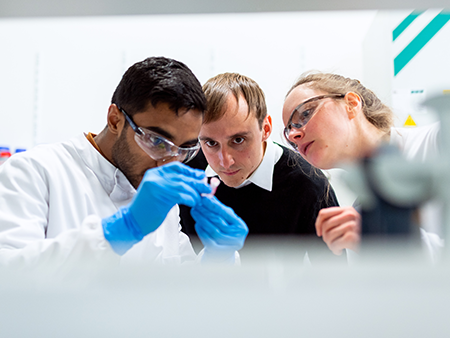The Patient-Researcher Partnership is Fundamental for Rheumatology Research at the CHU De Québec-UL Research Center
 Arthritis is defined as inflammation of the joints, but it also refers to a set of complex inflammatory diseases such as rheumatoid arthritis, systemic lupus erythematosus (SLE), or scleroderma, and others. The challenges of improving the health of people with these diseases are numerous and it can only be solved through targeted and multidisciplinary research.
Arthritis is defined as inflammation of the joints, but it also refers to a set of complex inflammatory diseases such as rheumatoid arthritis, systemic lupus erythematosus (SLE), or scleroderma, and others. The challenges of improving the health of people with these diseases are numerous and it can only be solved through targeted and multidisciplinary research.
With this in mind, Dr. Paul Fortin, Senior Scientist at Arthritis Research Canada, rheumatologist, Professor at Laval University, and a Clinical Researcher at the CHU de Québec-Université Laval, developed a program to better understand the bio-psycho-social impact of chronic rheumatic diseases. He is particularly interested in finding treatments and interventions for systemic lupus erythematosus (SLE), the antiphospholipid antibody syndrome (APS), and systemic autoimmune rheumatic diseases (SARDs).
Systemic autoimmune rheumatic diseases, known as SARDs, are chronic autoimmune disorders that result in inflammation and organ damage. They can lead to further health concerns and, in some cases, even premature death.
Dr. Fortin’s Research Program on SARDs is a Superb Example of Collaboration
In 2013, Dr Fortin created and established a biobank – a collection of biospecimens from patients with rheumatoid arthritis (RA), lupus, scleroderma or inflammatory myositis. The biobank is also linked to a database with clinical data associated with the biospecimens.
Collaborating for Success
Dr. Fortin and his team collaborate with numerous researchers from the CHU de Québec-UL. This allows Dr. Fortin’s SARDs research to be enriched with new scientific data, and for the other researchers, they can validate theories developed in the lab by using the data provided from the biobank. Additionally, they benefit from the expertise of rheumatologists and other clinical researchers.
More importantly, Dr. Fortin’s research brings together scientists who are working independently, thus enabling new collaborative research. For instance, the early prediction of the response to methotrexate in patients with rheumatoid arthritis, and the development of the internet tool for lupus patients, MyLupusGuide®. These and many more research projects were made possible thanks to the biobank set up by Dr. Fortin.
Patient Involvement in Research
Patients with arthritis want to help develop new treatments by sharing their personal experiences. However, patients sometimes feel disconnected from the research process as it is often seen as work done in a lab setting. Patient involvement is critical at all stages of the research, as it helps ensure research questions are tailored to the needs of patients living with arthritis. Similarly, by participating in research patients can learn and better understand their disease.
In Quebec, patients interested in getting involved in research have joined together to form the Patients Interested in Arthritis Research (PIRA) group and are working to make this collaboration between researchers and patients successful.
Thanks to their dedication, engagement and sharing of experiences, the patient-researcher partnership will continue to evolve and strengthen, allowing for more meaningful collaborations to take place.




















































